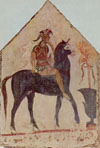Outline
This module covers war and society from the Greek Archaic Age in the eighth century B.C. to the fall of the western Roman Empire in the fifth century A.D. The approach is thematic within a broad chronological framework. The module has two specific aims: it studies changes in the groups who fight wars, and the way these changes relate to larger social, economic and political movements; it also reconstructs the ways in which war was thought about by participants and non-combatants, and the shifts in these attitudes over time. Together these discussions argue for the centrality of war in both Greek and Roman societies at most times. A wide variety of source material is used; archaeology is relevant, but the most important evidence is provided by literary texts: these range in time from Homer to Ammianus and Procopius, and were composed by famous authors such as Thucydides and Tacitus or lesser known ones such as Aeneas Tacticus or Aelian. Artistic evidence, both public and private, is also studied.
Module objectives
- To stimulate the curiosity of students by studying material which will, to an extent, be broadly familiar, but tackling it from different angles.
- To introduce students to the literary, documentary and material evidence for ancient warfare, and to develop analytical and research skills in manipulating and extrapolating from this evidence.
- To encourage students to think about war as a cultural construct whose changing significance is especially relevant to the social and economic history of the ancient world.

